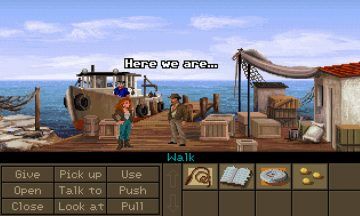Alexander Stern at the Los Angeles Review of Books:
 When I was a child, my brother and I played a computer game based on the Indiana Jones movie franchise. In the course of his adventures, Indy would sometimes come to a delicate impasse that required tact and nuance to resolve. Some adversary was blocking his path to a relic or treasure (including, oddly enough, one of Plato’s lost dialogues), and he needed to say just the right thing to get past them and on to the next challenge. The game offered players a selection of five or so sentences to choose from. The world would sit there in 8-bit paralysis and wait while we pondered how to make it do what we wanted. Press enter on the right sentence and pixelated Indy would sail through. Choose something inapt and game over.
When I was a child, my brother and I played a computer game based on the Indiana Jones movie franchise. In the course of his adventures, Indy would sometimes come to a delicate impasse that required tact and nuance to resolve. Some adversary was blocking his path to a relic or treasure (including, oddly enough, one of Plato’s lost dialogues), and he needed to say just the right thing to get past them and on to the next challenge. The game offered players a selection of five or so sentences to choose from. The world would sit there in 8-bit paralysis and wait while we pondered how to make it do what we wanted. Press enter on the right sentence and pixelated Indy would sail through. Choose something inapt and game over.
We are all playing Indiana Jones and the Fate of Atlantis now. A significant chunk of our lives involves gaping at screens, finger hovering over the send button, weighing our options, strategizing, obsessing over what will happen next. When we’ve finally made our decision we sit back and wait for the program to update — the response to land in our inbox, the algorithmic world to process our input and tell us if it has produced the hoped-for effect — or, God forbid, backfired and ruined us forever.
The interpolation of screens into the fabric of our lives has changed the character of our interactions in innumerable small but important ways that we have scarcely begun to recognize, reckon with, or reconcile ourselves to.
More here.
